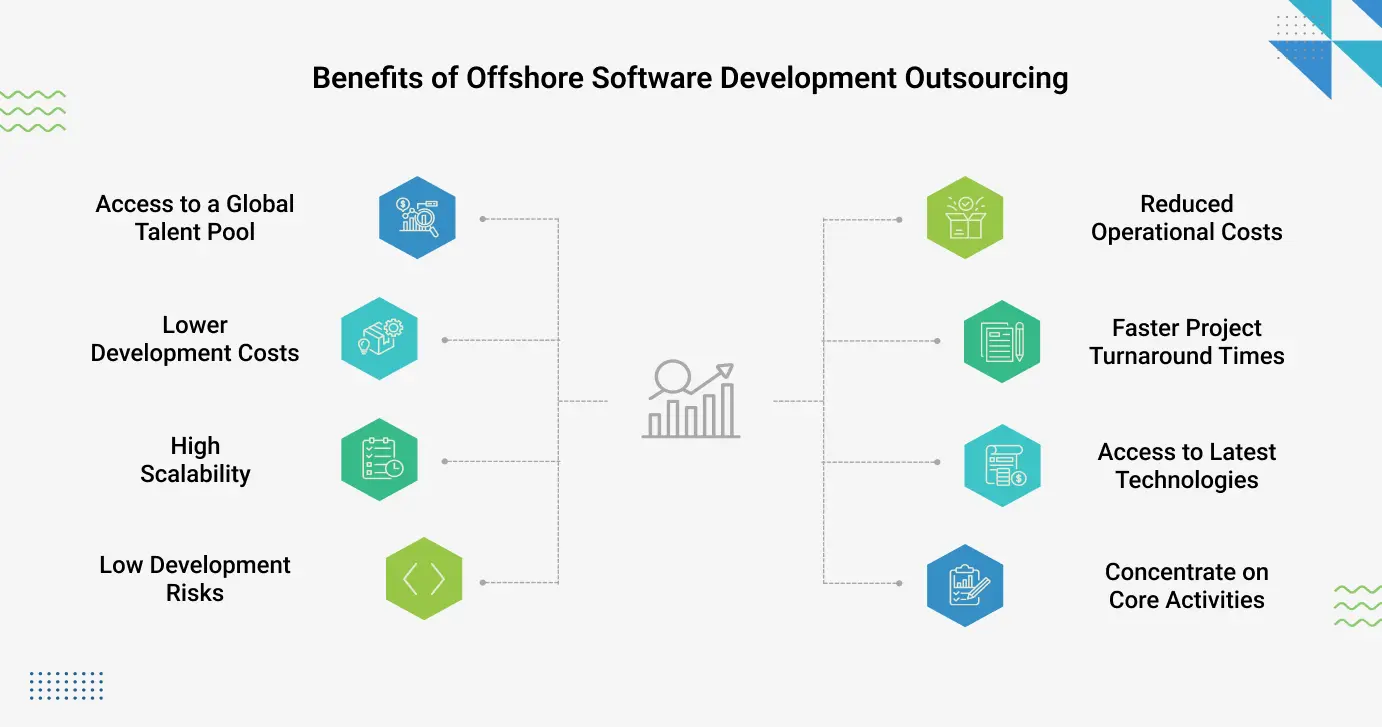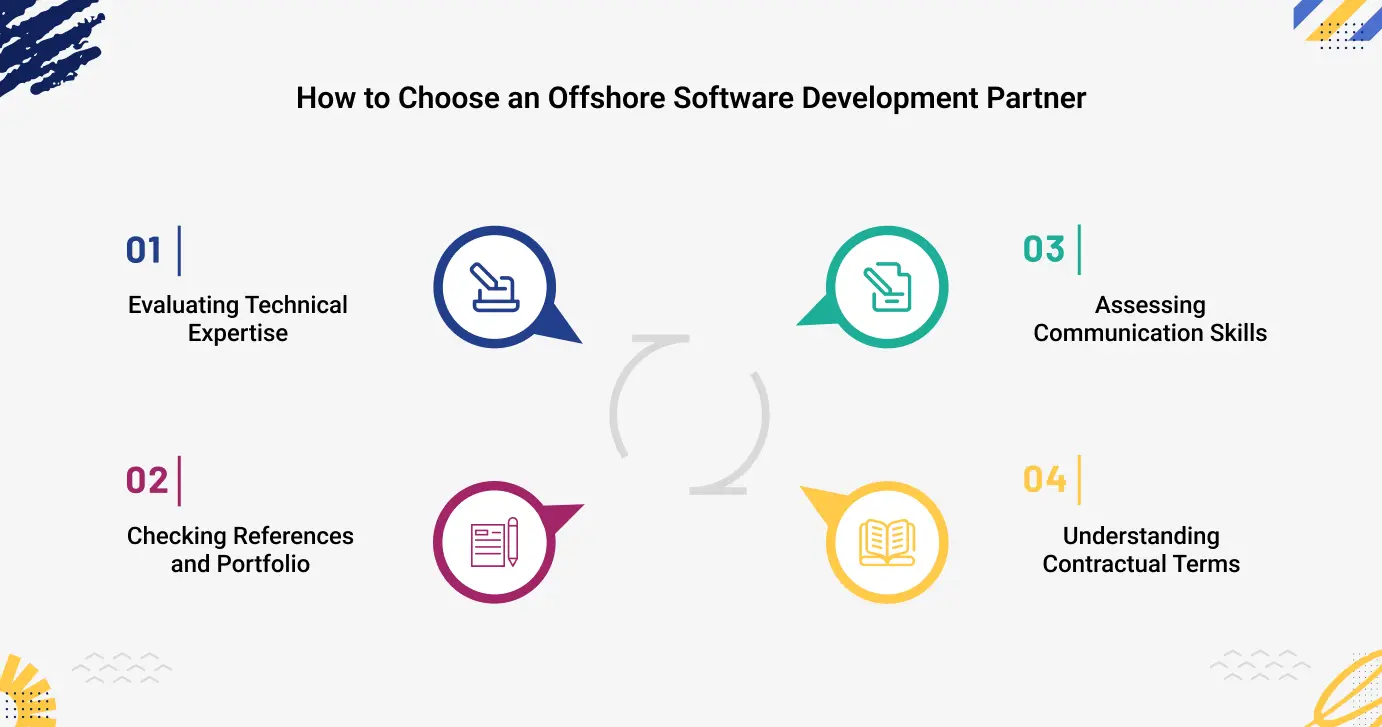Offshore Software Development Guide – Benefits, Challenges, Costs and More

Businesses are constantly looking for innovative ways to stay competitive in this interconnected world. One strategy that has gained significant traction over the past few decades is offshore software development.
Presently, the revenue in the IT Outsourcing market is expected to reach US$541.10bn in 2024, highlighting the growing importance of offshore software development. This approach reduces operational costs and also provides access to a wide range of skills and technologies. As a result, businesses can scale their operations more effectively and respond quickly to market changes.
However, like any business strategy, it comes with its own set of benefits and challenges. In this blog, we will delve into its benefits, address the challenges, and break down the costs involved. Understanding these aspects will help you make informed decisions that align with your business goals.
So, let’s start by understanding the meaning of offshore software development.
What is Offshore Software Development?
Offshore software development means hiring an external organization, typically located in a different country, to handle software development tasks. This strategy allows companies to utilize the expertise and cost-benefit of global talent pools to develop, maintain, and improve their software solutions.
It also involves outsourcing software development tasks to a distant country, often with huge time zone differences. Key players in the offshore software development market include countries such as India, China, Ukraine, Poland, and the Philippines.
These countries have established themselves as hubs for IT outsourcing due to their large pool of skilled software developers, affordable costs, and robust technological infrastructure.
Ready to Take the Next Step for Offshore Software Development?
Contact us today to discuss your project and discover our high-quality
solutions.
Benefits of Offshore Software Development Outsourcing
Offshore software development outsourcing offers several benefits for businesses looking to optimize their operations. Here are some of the key benefits:

Access to a Global Talent Pool
When you take an outsourcing route, it becomes easier to hire a dedicated development team. Offshore software development provides access to a vast pool of highly skilled and experienced developers. These professionals have specialized expertise and are well-versed in the latest industry standards and technologies to provide top-notch quality of service for your projects and scale according to your needs.
Reduced Operational Costs
By outsourcing, companies can significantly cut down on operational expenses as they don’t have to set up any office space, utilities, IT systems, and equipment. Offshore partners manage these operating costs, allowing business to allocate their budgets more efficiently and invest in other essential areas.
Lower Development Costs
Outsourcing to countries with lower labor costs helps in reducing the cost of hiring skilled professionals. This cost-effectiveness allows businesses to achieve their project goals within budget without compromising on quality.
Faster Project Turnaround Times
With teams working in different time zones, businesses can achieve continuous development cycles, which speed up project timelines. The ability to work on projects around the clock can lead to quicker delivery and faster time-to-market for products and services.
High Scalability
When you want to build a product, you can not estimate how much time or resources it will take to complete the development process. An offshore software development company makes it easier to scale up the number of developers and speed up the delivery time. This scalability ensures that businesses can adapt to changing requirements without the challenges of hiring or downsizing staff.
Access to Latest Technologies
Most offshore software companies specialize in the latest technologies and skills, which are hard to find in the case of in-house developers. So, when you hire a dedicated developer who is skilled in a certain technology, it will be difficult to hire an entire team with multi-tech specializations. This access ensures that projects are developed using the most up-to-date and efficient solutions available.
Offshore software development not only provides businesses with access to skilled developers but also enables them to leverage white label software development solutions.
Low Development Risks
When you hire reputable offshore firms, they implement robust risk management strategies and quality assurance processes. These measures help remove common development risks, such as project delays and technical issues, ensuring the smooth execution of projects.
Concentrate on Core Activities
One of the best benefits of outsourcing software development is that businesses can free up internal resources and focus on their core competencies. This concentration on strategic activities improves overall efficiency and productivity, which drive business growth and innovation.
Challenges That Come With Offshore Development
Communication Barriers
There can be language differences and different communication styles, which lead to misunderstandings and misinterpretations when working with offshore teams. Also, coordinating across different time zones can make real-time communication difficult, which slows down project progress and creates delays in responses to critical issues.
Quality Control
It can be challenging to always make sure that the offshore team meets your quality standards and project specifications. There can be differences in development practices and standards, which can lead to inconsistencies in deliverables. So regular monitoring, thorough documentation, and consistent feedback are necessary to maintain high-quality outputs and avoid costly rework.
Check out some of the best practices of IT outsourcing
Cultural Differences
Different cultural backgrounds can result in different work ethics, decision-making processes, and business practices. For example, offshore teams might have different approaches to deadlines, hierarchy, and feedback. So, passing through these cultural differences requires sensitivity and understanding to create a productive and cohesive working relationship.
Security and Confidentiality
When outsourcing development to an offshore team raises concerns about data protection and intellectual property security. The physical and digital security measures in offshore locations may differ from your own standards. So, it’s crucial to implement strict confidentiality agreements, robust cybersecurity measures, and regular audits to protect sensitive information.
Project Management Complexities
Managing a remote offshore team requires strong project management skills to handle time zone differences, monitor progress, and ensure it aligns with project goals. The geographical distance can make it harder to track day-to-day activities and maintain a clear line of vision on the project’s status. Clear communication, regular updates, and the use of collaborative tools are essential to keep the project on track and maintain transparency.
Legal and Compliance Issues
Every country has different legal frameworks and regulatory requirements, which can complicate contract negotiations and compliance. Issues such as data protection laws, intellectual property rights, and labor regulations can vary significantly and must be carefully navigated. So, understanding and following these regulations is essential to avoid legal complications and ensure smooth project execution.
Dependence on Technology
If you want seamless collaboration with offshore teams, reliable internet connectivity and access to necessary technologies are crucial. Any disruptions or technical issues, such as power outages or connectivity problems, can disrupt communication and project progress. So offshore partners help you maintain uninterrupted workflow and effective collaboration as they have stable and advanced technological infrastructure.
Need Expert Advice on Your Software Development Project?
Schedule a consultation with our team to explore how we can help you
achieve your tailored solutions to meet your specific needs.
Cost Considerations in Offshore Software Development
Offshore software development offers you several cost benefits, but it’s important to understand the various costs of custom software development, help to make a budget effectively.
The primary costs include initial setup fees, ongoing salaries, and administrative expenses. Additionally, businesses should consider hidden costs such as potential delays, rework, and management overhead.
Effective planning and regular monitoring help reduce these expenses and maximize overall cost savings from offshoring. Another important factor that needs to be considered in offshore software development is the location of the offshore team.
Here are a few common regions with their estimated costs.
| Regions | Average Hourly Rate |
|---|---|
| Southeast Asia | $10 to $25 |
| Latin America | $20 to $40 |
| Eastern Europe | $30 to $50 |
| India | $15 to $30 |
By carefully considering and planning for these cost factors, businesses can better manage their budgets and ensure the financial feasibility of their offshore software development projects.
How to Choose an Offshore Software Development Partner

It is crucial to select the right offshore software development partner for the success of your project. Here are some key factors to consider:
Evaluating Technical Expertise
Offshore partners should have the technical skills and expertise required for your project. Review their technology stack, development methodologies, and the certifications held by their team members. Analyze their ability to work with the latest tools and technologies that align with your project requirements. Conduct technical interviews or ask for a small test project to validate their capabilities.
Checking References and Portfolio
It’s important to examine the offshore partner’s portfolio to understand their experience in similar projects. Look for case studies, project examples, and client testimonials that highlight their successes and problem-solving abilities. Contact previous clients to get honest feedback on their experiences, focusing on the partner’s reliability, quality of work, and ability to meet deadlines.
Assessing Communication Skills
Effective communication is crucial to managing an offshore team. Evaluate the partner’s expertise in your preferred language and their communication tools and practices. Make sure they can provide regular updates, are responsive to queries, and can clearly express project progress and issues. Establish communication protocols and expectations early on to avoid misunderstandings and ensure smooth collaboration.
Understanding Contractual Terms
Carefully review the contractual terms to ensure they align with your project’s goals and protect your interests. Pay attention to details such as intellectual property rights, confidentiality agreements, and payment terms. Ensure the contract outlines clear deliverables, timelines, and quality standards. It’s advisable to involve legal experts to review the contract and address any potential concerns.
By thoroughly going through each step, you can select a reliable and competent offshore software development partner that meets your project needs and drives successful outcomes.
Best Practices for Successful Offshore Software Development
Here are the best practices for successful offshore software development:
- Establish effective communication tools like Slack or Microsoft Teams and protocols to ensure transparency and resolve issues quickly.
- Clearly outline project requirements and objectives from the outset to maintain alignment and manage expectations.
- Implement iterative development practices like Scrum or Kanban for flexibility and continuous improvement.
- Build collaboration and cultural awareness across teams to build trust and improve productivity.
- Implement rigid testing processes to make sure software meets quality standards and user expectations.
- Track key metrics to measure progress, identify bottlenecks, and optimize workflows.
- Proactively identify and address potential risks, including cultural differences and technical dependencies.
- Invest in ongoing learning to keep skills current and promote team growth.
- Maintain open communication and clear roles to build trust.
- Regularly evaluate strategies and adapt based on feedback and changing project needs.
Conclusion
We hope this guide has provided valuable information about offshore software development. By leveraging global talent pools, businesses can achieve significant cost savings, access specialized expertise, and speed up project timelines.
If you are looking to partner with a reliable offshore software development team, we are here to help. At Guru TechnoLabs, we offer expertise in offshore software development services, ensuring high-quality solutions tailored to your needs.
Contact us today to explore how we can support your next software development project.
Frequently Asked Questions
Offshore software development involves outsourcing to a team in a different country. It gives you access to global talent and often saves costs. Onshore development occurs within the same country as the business, focusing on neighborhood and local expertise.
Offshoring provides several benefits, such as cost savings, access to specialized skills, scalability, and accelerated project timelines, which make it beneficial for you to offshore your project in order to stay competitive.
You can monitor project progress by using project management tools, establish clear milestones and KPIs, conduct regular status meetings, and maintain open communication channels to track progress effectively.
Managing time zone differences involves coordinating overlapping work hours for real-time collaboration, scheduling regular meetings accommodating all time zones, and using asynchronous communication tools to bridge time zone gaps.
Yes, offshore outsourcing can be suitable for long-term projects when there is clear communication, robust project management, and a strong partnership with the offshore team. Continuous monitoring and adaptation of strategies are key to continuous success.





















